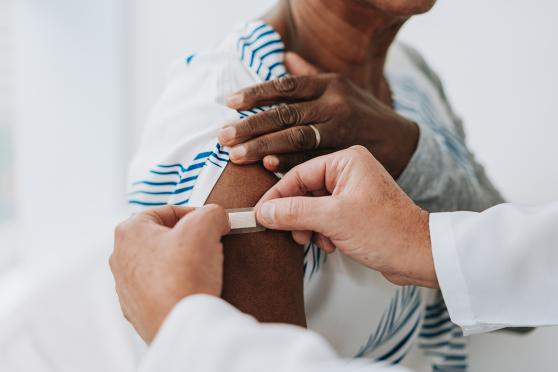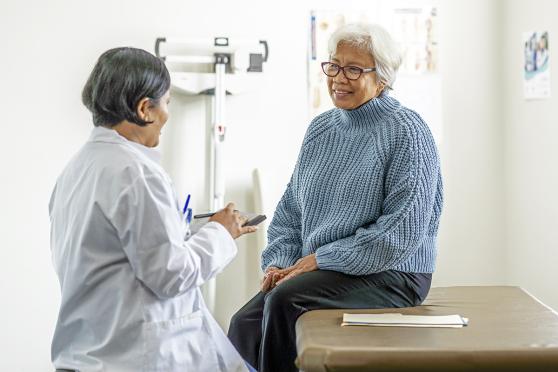How to catch cervical cancer early (or prevent it altogether)
Cervical cancer used to be the leading cause of cancer death for American women. Luckily, we now have screening tests that can detect it early, when it’s treatable. Here, experts answer your top questions about Pap smears, HPV tests, and more.

A cervical cancer screening is a simple test that can catch cervical cancer early, or even before it starts.
Cervical cancer used to be the leading cause of cancer deaths among American women, according to the Centers for Disease Control and Prevention (CDC). But thanks to the Pap test, it’s now one of the most treatable cancers. This simple procedure can detect cancer early, when it’s easier to treat, and pinpoint abnormal changes that could lead to it. But it only works if you’re getting regular screenings.
When you head back to your gynecologist or primary care physician, don’t be surprised if they recommend an additional screening test for human papillomavirus (HPV). Although infection with HPV, which is a very common sexually transmitted virus, often goes away on its own, scientists now know that specific strains of HPV cause virtually all cervical cancers.
“Infection with HPV is sufficient for the development of cervical cancer,” says Paul Blumenthal, M.D., professor of obstetrics and gynecology, emeritus, at Stanford University Medical Center. At least 90 percent of cervical cancers are caused by HPV alone.
Here’s what you need to know about this test and what it means for you.
1. What’s the difference between a Pap test and an HPV test?
The main difference is that an HPV screening checks for the specific strains of HPV that can lead to cervical cancer. It lets you know if you’ve been exposed. The Pap test can detect cervical cancer and abnormal, precancerous cells (or dysplasia).
2. Who needs a Pap test versus an HPV screening?
It depends on your age and your risk level.
The U.S. Preventive Services Task Force (USPSTF) recommends that women ages 21 to 29 have a Pap test (also called cervical cytology) every three years.
For women ages 30 to 65, the USPSTF now recommends a few different screening options: a Pap test every three years; human papillomavirus (HPV) screening every five years; or both tests every five years.
“If you’re HPV negative, you’re unlikely to have problems in the next few years,” explains Dr. Blumenthal. “But as we have more people now doing HPV testing in addition to, or as a precursor to, Pap, we can predict the future better than with Pap alone,” he says.
Pap tests aren’t given to people under age 21, or to low-risk women over age 65 who’ve had normal Pap tests for a decade.
Don’t forget to always discuss with your doctor what kinds of screenings are best for you and when they should be performed. For more information, check out this fact sheet from the National Cancer Institute.
3. Do I still need a cervical cancer screening if I had the HPV vaccine?
Yes, according to current CDC recommendations vaccinated women will still need regular cervical cancer screening. This is because the vaccine protects against most—but not all—HPV types that cause cervical cancer. Also, women who received the vaccine after becoming sexually active may not get the full benefit of the vaccine if they had already been exposed to HPV.
4. How do you protect against cancer-causing HPV?
There are three FDA-approved vaccines that provide immunity from the most serious HPV types: Gardasil, Gardasil 9, and Cervarix. The CDC recommends that preteens starting at age 9 and young adults up to 26 receive the HPV vaccine. Those up to 45 years old may consider receiving the vaccine after talking with their doctor.
5. If I have the HPV test, does that mean I won’t have a Pap test?
Not necessarily. The HPV test and the Pap test are often done simultaneously because they both involve collecting cervical cells, placing them in a solution, and creating a slide for a technician to analyze. The cells are deemed normal, suspicious, or abnormal for a Pap test, and either positive or negative for HPV.
6. Is there anything I should do (or not do) in preparation for the exam?
For 48 hours ahead of your exam, skip activities that could alter vaginal flora, including sex, douching (which doctors recommend avoiding anyway), and tampon use. If possible, try to schedule testing shortly after your period.
Also, make sure to discuss with your doctor any concerns you have and any family history of cancer, including cervical cancer.
7. Should I worry about an abnormal reading?
Not quite yet. “An abnormal Pap test or a positive HPV test doesn’t mean you have cancer,” says Dr. Blumenthal. A mishandled slide or cervical inflammation (which usually does not come with symptoms) may be to blame, and it can usually be corrected at the retest.
And even if signs of precancer do exist, most cases are easily treated.
8. What if I think I may have missed an exam and I’m not up to date on my screenings or vaccinations?
If you think you may have missed an exam or are not up to date with your HPV vaccination, contact your physician’s office as soon as possible and ask if you need to make an appointment.
Knowledge is power. The sooner you get checked, the sooner you can take action and put your mind at ease.


